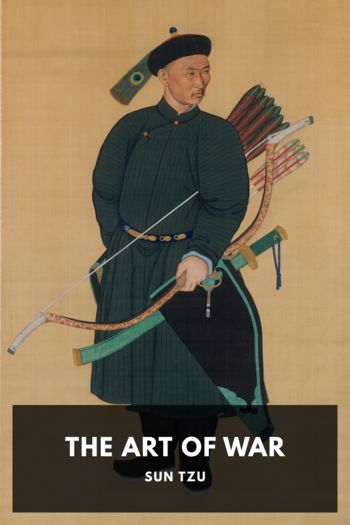The Art of War by Sun Tzu (elon musk reading list TXT) 📕

- Author: Sun Tzu
Book online «The Art of War by Sun Tzu (elon musk reading list TXT) 📕». Author Sun Tzu
天下 of course stands for the loose confederacy of states into which China was divided under the Chou dynasty. The belligerent who holds this dominating position can constrain most of them to become his allies. See infra, “On open ground, I would …” 衆 appears at first sight to be “the masses” or “population” of the Empire, but it is more probably, as Tu Yu says, 諸侯之衆. ↩
Capt. Calthrop’s “path-ridden ground” might stand well enough for 交地 above, but it does not bring out the force of 衢地, which clearly denotes the central position where important highways meet. ↩
After 多, the Tʽung Tien intercalates the gloss 難以返. ↩
Wang Hsi explains the name by saying that 兵至此者事勢重也 “when an army has reached such a point, its situation is serious.” Li Chʽüan instances (1) the victorious march of 樂毅 Yo I into the capital of Chʽi in 284 BC, and (2) the attack on Chʽu, six years later, by the Chʽin general 白起 Po Chʽi. ↩
Or simply, “forests.” I follow the Tʽu Shu in omitting the 行 before 山林, given in the standard text, which is not only otiose but spoils the rhythm of the sentence. ↩
圮 pʽi³ (to be distinguished from 圯 i⁴) is defined by Kʽang Hsi (after the Shuo Wên as 毀 “to destroy.” Hence Chia Lin explains 圮地 as ground 經水所毀 “that has been ruined by water passing over it,” and Tu Yu simply as 沮洳之地 “swampy ground.” But Chʽên Hao says that the word is specially applied to deep hollows—what Chu-ko Liang, he tells us, used to designate by the expressive term 地獄 “earth-hells.” Compare the 天井 of note 455 on IX. ↩
The situation, as pictured by Tsʽao Kung, is very similar to the 圍地, except that here escape is no longer possible: 前有高山後有大水進則不得退則有礙 “A lofty mountain in front, a large river behind, advance impossible, retreat blocked.” Chʽên Hao says: 人在死地如坐漏船伏燒屋 “to be on ‘desperate ground’ is like sitting in a leaking boat or crouching in a burning house.” Tu Mu quotes from Li Ching a vivid description of the plight of an army thus entrapped: “Suppose an army invading hostile territory without the aid of local guides:—it falls into a fatal snare and is at the enemy’s mercy. A ravine on the left, a mountain on the right, a pathway so perilous that the horses have to be roped together and the chariots carried in slings, no passage open in front, retreat cut off behind, no choice but to proceed in single file (鴈行魚貫之嚴). Then, before there is time to range our soldiers in order of battle, the enemy in overwhelming strength suddenly appears on the scene. Advancing, we can nowhere take a breathing-space; retreating, we have no haven of refuge. We seek a pitched battle, but in vain; yet standing on the defensive, none of us has a moment’s respite. If we simply maintain our ground, whole days and months will crawl by; the moment we make a move, we have to sustain the enemy’s attacks on front and rear. The country is wild, destitute of water and plants; the army is lacking in the necessaries of life, the horses are jaded and the men worn-out, all the resources of strength and skill unavailing, the pass so narrow that single man defending it can check the onset of ten thousand; all means of offence in the hands of the enemy, all points of vantage already forfeited by ourselves:—in this terrible plight, even though we had the most valiant soldiers and the keenest of weapons, how could they be employed with the slightest effect?” Students of Greek history may be reminded of the awful close to the Sicilian expedition, and the agony of the Athenians under Nicias and Demosthenes. (See Thucydides, VII 78 sqq.) ↩
But rather let all your energies be bent on occupying the advantageous position first. So Tsʽao Kung. Li Chʽüan and others, however, suppose the meaning to be that the enemy has already forestalled us, so that it the meaning to be that the enemy has already forestalled us, so that it would be sheer madness to attack. In the 孫子敘錄, when the King of Wu inquires what should be done in this case, Sun Tzǔ replies: “The rule with regard to contentious ground is that those in possession have the advantage over the other side. If a position of this kind is secured first by the enemy, beware of attacking him. Lure him away by pretending to flee—show your banners and sound your drums—make a dash for other places that he cannot afford to lose—trail brushwood and raise a dust—counfound his ears and eyes—detach a body of your best troops, and place it secretly in ambuscade. Then your opponent will sally forth to the rescue.” ↩
Because the attempt would be futile, and would expose the blocking force itself to serious risks. There are two interpretations of 無絕. I





Comments (0)